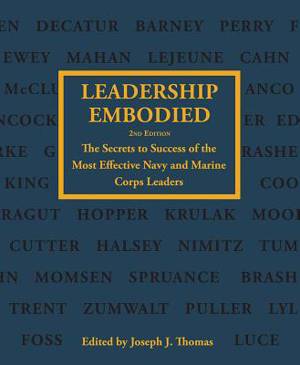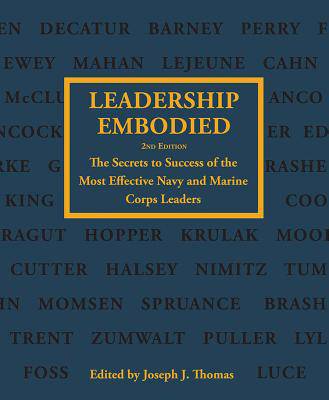
- Retrait gratuit dans votre magasin Club
- 7.000.000 titres dans notre catalogue
- Payer en toute sécurité
- Toujours un magasin près de chez vous
- Retrait gratuit dans votre magasin Club
- 7.000.0000 titres dans notre catalogue
- Payer en toute sécurité
- Toujours un magasin près de chez vous
Leadership Embodied 2nd Edition
The Secrets to Success of the Most Effective Navy and Marine Corps Leaders
Joseph J Thomas
Livre broché | Anglais
43,45 €
+ 86 points
Description
Leadership is a most demanding undertaking. How do some people make it seem so simple, so natural and instinctive? In the age-old debate as to whether leaders are born or made, Thomas contends that the answer is both. Great leaders throughout history were born with certain capabilities. Preparation honed those capabilities. Then that ability and preparation were combined with a will to lead. When circumstances demanded, the great leaders of history pulled these attributes together to create results that drove the course of history. While leaders are present in every aspect of human undertaking, we chose to illustrate each of the components of leadership through the most dramatic and demanding of all human undertakings--war and the preparations for war. Wartime leaders are leaders "writ with a darker pen." Wartime challenges are, because of the life and death nature of the affair, more monumental and exacting. In the selection of individuals to illustrate each point, we chose wartime leaders as well as those who guided their subordinates and organizations in preparation for combat. Further we chose American leaders with a distinct and obvious bias towards the navy and Marine Corps. Multiple reasons led us to our approach for Leadership Embodied. First, a biography is perhaps the most effective method for imparting leadership lessons. Simple listings of prescriptive traits or descriptive qualities are patronizing and, frequently, boring. Second, our biographical examples are familiar to most--or at least they should be. Finally, all of these historical selections have dramatically shaped today's institutions, practices, and customs within the naval services. These are not marginal figures with marginal influence. The individuals included, and their respective leadership attributes, should be required reading for any student of leadership. Each has a particular lesson for midshipmen on their journey to becoming a navy or Marine Corps officer. This book does not promise to be a panacea. There is no short cut. Leadership does not follow a prescribed path. We study examples to inspire us to become better, to be strong when it is easy to give in, and to know others have gone before us and faced insurmountable odds. Leadership, as an ill-defined social science, crosses boundaries with several disciplines including sociology, psychology, philosophy, and history. We have selected a method that combines the psychological "profile" of effective leaders and the historical context of the impact their leadership brought to organizations and events. Our hope for this book is that these case studies illustrate the basic elements--in themselves the very essence--of leadership. It is through inherent talent, arduous preparation, and practical experience that we become capable leaders. The reader brings the first to the table; then we offer a small token in the second pursuit; and circumstances enable the third.
Spécifications
Parties prenantes
- Auteur(s) :
- Editeur:
Contenu
- Nombre de pages :
- 256
- Langue:
- Anglais
Caractéristiques
- EAN:
- 9781612513034
- Date de parution :
- 15-10-13
- Format:
- Livre broché
- Format numérique:
- Trade paperback (VS)
- Dimensions :
- 152 mm x 229 mm
- Poids :
- 238 g

Les avis
Nous publions uniquement les avis qui respectent les conditions requises. Consultez nos conditions pour les avis.






